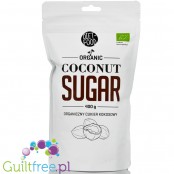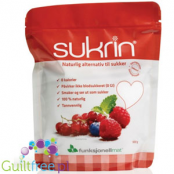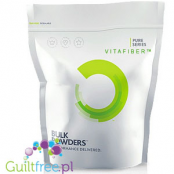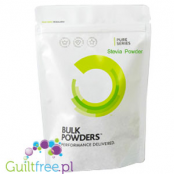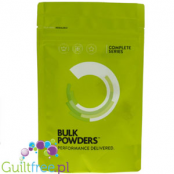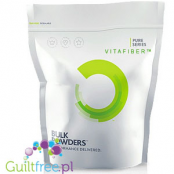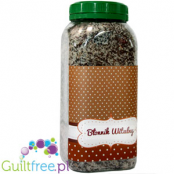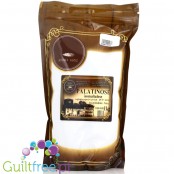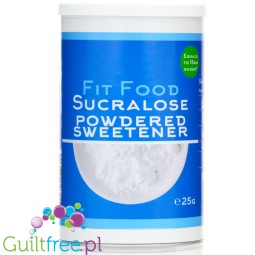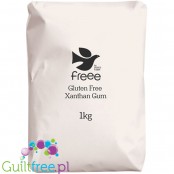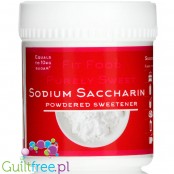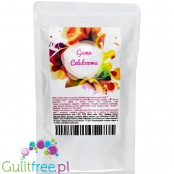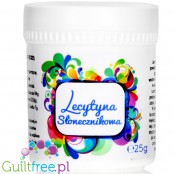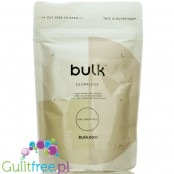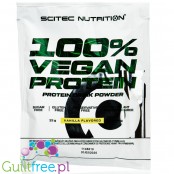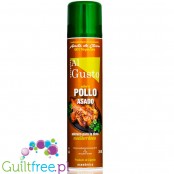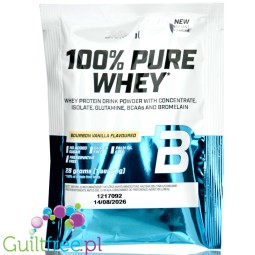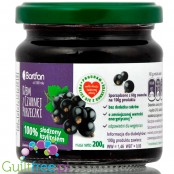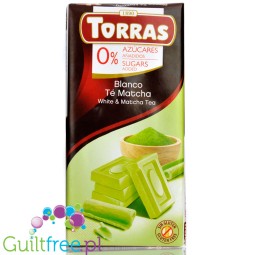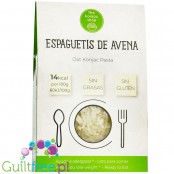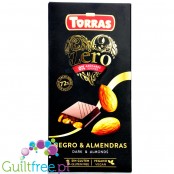Hotline: 885 925 336
E-mail: sklep@guiltfree.pl
Fast shipping up to 48 hours
As many as 12 949 light products
Targroch Inulin chicory root powder 250g
Inulin is a natural sugar substitute that is gaining more and more popularity among people looking for healthier sweetening alternatives. Inulin is a type of dietary fiber found in plants such as chicory, artichokes, onions and chicory root. It has a whitish color and a slightly sweet taste. Inulin is soluble in water and has the ability to form gel-like structures, which affects its sweetening properties, it is also a kind of thickener. Inulin is a natural sugar substitute with low calorific value, low glycemic index and prebiotic effect. It can be used as a healthier alternative to traditional sugar in a variety of foods and drinks.
Inulin is low in calories, meaning it provides fewer calories than traditional sugar. In addition, inulin has a low glycemic index, which means it has less effect on blood glucose levels. Therefore, it is more suitable for people with diabetes or who are trying to maintain a stable blood sugar level. Inulin acts as a prebiotic, meaning it acts as a nutrient medium for beneficial gut bacteria. It helps maintain a healthy intestinal microflora, which can benefit the digestive system and overall health. Inulin has the ability to sweeten, but does not provide significant amounts of calories. Thanks to this, it can be used as a natural sugar substitute in various dishes and drinks to reduce the amount of sugar consumed, inulin is often a component of sugar-free chocolates for diabetics, it lowers the calorific value and at the same time reduces the glycemic load of chocolate.
Inulin can also be used in the ketogenic diet, which is characterized by a low intake of carbohydrates and a high intake of fats.
- Increasing Fiber: The ketogenic diet often focuses on eating low in carbohydrates, which can lead to a dietary fiber deficiency. Inulin is a source of dietary fiber and can help to increase its intake in the ketogenic diet, supporting the health of the digestive system and maintaining proper intestinal motility.
- Blood sugar regulation: Although inulin is a carbohydrate, it has no significant effect on blood glucose levels and can be used in a ketogenic diet. Its low glycemic index means it doesn't cause a blood sugar spike, which is important in maintaining a state of ketosis.
- Taste and Texture Improvement: Inulin has a slight sweet flavor and creamy texture, which can be useful in a ketogenic diet where traditional sweeteners are often lacking. Adding inulin to drinks, yoghurts, muesli or desserts can help you achieve a subtle sweetness without having to reach for other sweeteners or sugars.
- Maintaining a healthy gut microflora: Inulin acts as a prebiotic and may support the growth of beneficial gut bacteria. In a ketogenic diet, which is often high in fat and restricts some fiber intake, inulin can help maintain a healthy balance of gut microflora.
However, it is worth remembering that inulin is a carbohydrate and may have a minimal effect on ketone levels. Therefore, it is important to include its consumption in the overall balance of macronutrients and adjust the dosage to your individual needs in the ketogenic diet.
In its natural state, inulin is found in the roots or tubers of some plants. It is a polysaccharide consisting of several dozen fructose molecules connected in unbranched chains. It is resistant to the digestive enzymes of the human digestive system, both those found in saliva and in further sections of the digestive tract.
The inability to digest inulin means that it is not absorbed in the small intestine and reaches the large intestine unchanged, where it can be hydrolyzed by the intestinal bacteria living there. Inulin meets five basic criteria to play the role of dietary fiber in the body:
- origin from edible parts of plants,
- the compound belongs chemically to carbohydrates,
- resistance to mammalian digestive enzymes,
- lack of absorption in the small intestine,
- hydrolysis or fermentation by bacteria in the large intestine.
Nutrition Facts
Your review appreciation cannot be sent
Report comment
Report sent
Your report cannot be sent
Write your review
Review sent
Your review cannot be sent
Chicory root inulin
Net Weight: 250g
Ingredients: chicory root inulin 100%
Allergens: may contain gluten, peanuts, soy, sesame and other nuts
Nutritional values in 100g: energy value 208.0kcal / 874.0kJ, fats 0.0g (including saturated fats 0.0g), carbohydrates 7.0g (including sugars 7.0g), fiber 90.0g, protein 0, 0g, salt 0.1g
Nutritional values in 50g: energy value 104.0kcal / 437.0kJ, fats 0.0g (including saturated fats 0.0g), carbohydrates 3.5g (including sugars 3.5g), fiber 45.0g, protein 0, 0g, salt 0.0g
Distributor: country of origin of the raw material Belgium, packed for Targroch
Store in a dry and dark place in a tightly closed container.
Featured Products
Sukrin is a natural sweetener with erythritol
Konjak Flour
Xanthan gum E-415
VitaFiber™ 0,5KG Naturalny Słodzik 90% Błonnika
Bulk Powders Pure Series ™ Stevia Powder - Pure Stevia extract
Bulk Powders Pure Series ™ sucralose Powder - Pure sucralose
VitaFiber ™ Powder - VitaFiber ™ Prebiotic Fiber
Splenda sweetener in sucralose sachets
Chia Sage Spanish
Fiber cleansing vital
Palatose (isomaltulose)
VitaFiber™ Naturalny Słodzik 90% Błonnika 50g
Good Good Sweet Drops of Stevia, Coconut flavor
Good good sweet drops of stevia, vanilla flavor
Good Good Sweet Drops of Stevia, Chocolate flavor
Fit Food Tabletop sweetener 100% sucralose
Choc Zero Honest Syrup, sugar free syrup Raspberry
Choc Zero Honest Syrup, sugar free syrup Chocolate with prebiotic fiber
Choc Zero Honest Syrup, sugar free syrup Caramel with prebiotic fiber
Choc Zero Honest Syrup, sugar free syrup Maple Pecan with prebiotic fiber
Choc Zero Honest Syrup, sugar free syrup Vanilla with prebiotic fiber
Doves Farm gluten free Xanthan Gum 1kg
LorAnn Oils Cookies & Cream 1 Dram Food Flavouring Oils
FitFood Purely Sweet Acesulfame-K, 100% pure concentrated sweetener
FitFood Purely Sweet Aspartame, 100% pure aspartame E951
FitFood Purely Sweet Sodium Cyclamate - 100% pure concentrated sweetener
FitFood Purely Sweet Sodium Saccharin 100% pure sweetener without fillers
FitFood Purely Sweet Steviol Glycosyde - pure sweetener, standarised 80% Rebaudioside A
Cellulose Gum 100g (CMC, Carboxymethyl cellulose E-466)
Good Good Sweet Drops of Stevia Raspberry, liquid food flavoring with stevia
Good Good Sweet Drops of Stevia Strawberry, liquid food flavoring with stevia
Good Good Sweet Drops of Stevia Caramel, liqud caramel flavoring with stevia
Emulsifier sunflower lecithin
Locust bean gum 100g, thickener (E-410, carob gum, carob bean gum, carobin)
FitFood Purely Sweet Aspartame 100g, 100% pure aspartame E951
Vidrate Hydration Powder Mixed Berry 10 x 5g
Bulk Powders Pure Sucralose 100g
Scitec 100% Vegan Vanilla
Locco 0kcal Stevia Drops, Caramel
Sukrin Finesse Baking Sweetener is a natural sweetener with isomalt, erythritol, sucralose
Other customers also chose
Aerosoles Al Gusto Grilled Chicken - smakowa oliwa extra virgin w spray'u, smak Grillowany Kurczak
Sante Peanut Butter Protein Coconut - peanut butter & coconut cream with WPC & xylitol
Biotech USA 100% Pure Whey Bourbon Vanilla sachet 25g
Teisseire 0% Sugar Syrup Passionfruit
Bartfan blackcurrant fruit jam sweetened with xylitol only
Torras White chocolate with matcha tea without added sugar
Funky Flavors Sweet CocoLate - sweetened, liquid, sugar & fat free food flavoring
Konjac Shop Espaguetis de Avena - konjac shirataki noodles with oat fibre
Rocka Nutrition No Whey Clear Lemon Slush - vegan hydrolyzate, soda-like protein powder, sachet
Targroch Egg Plantain 250g husk
Ostrovit Mango Sauce - sugar free, only 9 calories
Torras Chocolate Negro Almendras Enteras
Funky Flavors Highly concentrated Vanilla flavor for shakes, desserts, yogurt, ice cream & pancakes
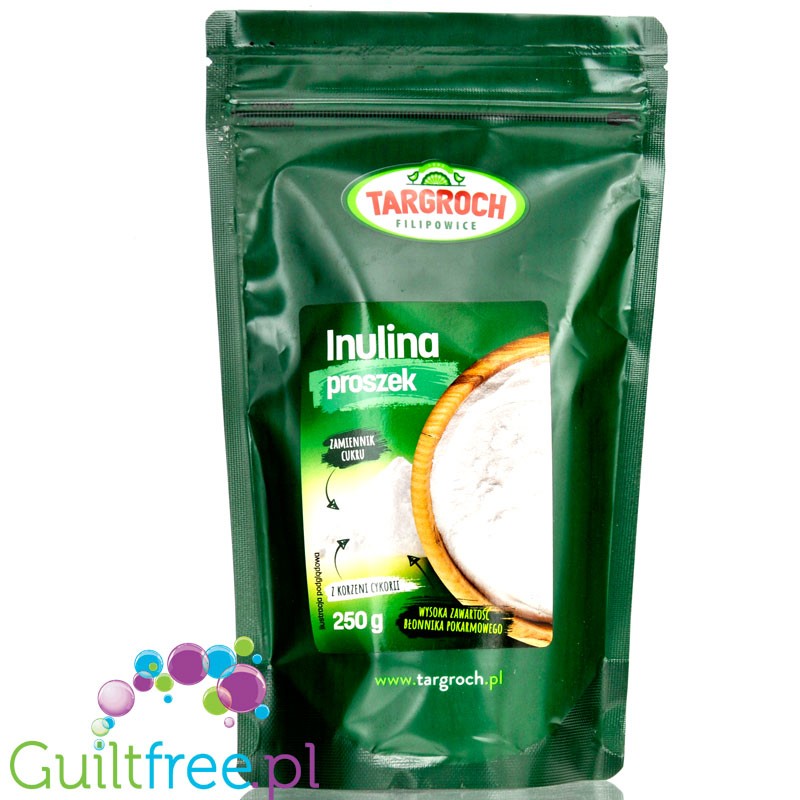
Inulin is a natural carbohydrate not digested by human enzymes. Occurs in the roots or tubers of some plants, most often obtained from chicory.
Inulin is mildly sweet in taste, has about 1/10 sweet sugar. They can eat people with diabetes and lose weight.





